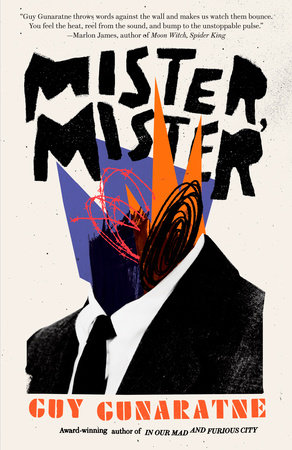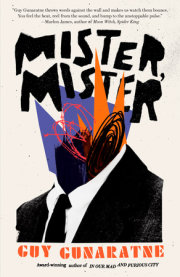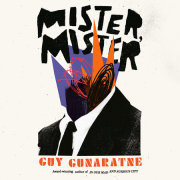IDIOT BOY
Mister, I have lost my tongue. A quick cut with a cinch, little jerk of the wrists. Easy, clean, deed done. I suppose you’d say it was madness, psychosis, insanity – but no, not likely. An act of liberation, that’s what. Permanence is what I was after. A final, effective riddance at the root – so,
snitch! – since tongues do not grow back.
I’ve little pieces of cotton packed into my cheeks now, Mister. And a cup of salty water to soothe my blackened mouth. Magic beans to heal the rest of it. And them nurses take regular swabs of my sutured pits. The discomfort is nothing. Not compared to the satisfaction I feel from knowing that I’ve won back – no less, with an act of bloody violence – what has always been mine. By which I mean, of course: the right to tell my own story.
I can put down what I really mean to say now, God willing.
And this time, Mister, you may even have my consent. You may listen. Though, I know, you’ll be wary. Not least, because you’ll have no control over what’s to be said. But then, what’s left to a person after speech is lost to them? Recollections and memories alone. And what harm can these silent things do, really, without a tongue to lift them to other people’s ears?
1. LETTERS I intend now to write down the rest of it. Get scribbling on these here pages you’ve sent me. I do this in the spirit of reconciling what has happened. Naturally, there are questions. But you should know there will be no half-truths to my telling. Nothing invented, nothing untrue – you should mark that in your official report. And I’ve agreed, honestly, to tell you all this, not because your bully courts frighten me, or because you have Her Majesty’s crest on your pin, or because you, yourself, intimidate me, Mister, sat there fiddling with your pen. It’s because I am guilty of everything you say that I did. Guilty of treason. Guilty of inspiring bad men. Guilty of all of it. And more. So, do me in after I’ve finished. Have me drawn, quartered, stoned into a pulp for all I care – have at it!
But for now, I just want you to listen.
I have plenty to say.
2. GREAT BRITAIN To return to your question, well – likely is, you’ve already made up your mind, Mister. I can tell from the sorts of questions you’ve already asked me, like why I hate your country. I don’t doubt it seems a little strange coming from me, but believe me when I say that I do not, not really.
Truly, I have missed your Great Britain. I’ve missed your old British mores, Mister. Your pasties and that. Your cuppa-teas. Your John Cleese. And your poets.
This country has always been a home for me. Only place that’s ever really claimed me, or that I could ever claim. I think about my childhood, my rambling half-cocked education, and then, my rise into fame and fortune.
It all happened here – right here for me, in this city, in this United Kingdom of the Great British Isles.
Nostalgia, call it. Remembrance maybe. I’m pining for the parts I was raised in. East Ham, that is, East London. Among local muftis, many mothers, wide boys, punters and clerics. Wouldn’t call the feeling patriotic – nothing as waxy as a word like that – but it does beg a better question. One that I’d quite like to put to you now, Mister, and that is this:
If the greatness of your Britain remains so assured, then why is it so difficult to hear someone hate it? Everything I’ve ever written, from the poetry to the long stories I’ve told – a litany of my many offending verses – every word was written under this same English sky, Mister, under which I was born, same as you!
My uncle Sisi Gamal – him, the old soapbox muezzin, who was always so clear about these things – said to me once:
Boy, there is nothing great about Britain – it’s a madhouse! A place only fit for slumlords, field hands and rabble. I didn’t know what he meant by it then. I was young. Too busy making faces in the mirrors, shadows on the walls, to notice your taste for bully justice. But now, here I am. Sat in this cell. Enduring a barrage of questions as to
why this,
why that,
why whatever hatred, and
why now . . . when to me, it’s obvious. As it should be to you.
It brings to my mind a saying, one from where my father is from, which translates from the Arabic like this:
As you sow, you shall so reap. It’s a saying that graces all scripture.
So, let that be my answer, Mister. For any more, you must ask my Allah. Since mine is a life He chose for me, and at a time He chose for me to live. Otherwise, you’re better off asking the times for answers. Since it was the times that also made me. Made my tongue. And by
times I mean the world out there, the big bright-wide: the West. Into which I was born, raised upright, lived an antic life, and did my best to scribble a little poetry and pray.
3. NAMES You asked my name. I’ve had so many over the years. I collect them like stamps or old stones. Some names were given to me with love and seriousness. Granted by those who wished I’d grow old and become rich and famous in the world. Other names were given to me in spite. Along the way I’ve discarded old names like old hats and borrowed new ones to replace the ones that grew tired.
It was your newspapers, all them red tops and magazines, who gave me my many aliases. The
Jihadi Boy-Poet, they called me. The
Hateful Fanatic, they said. I was the
Internet’s Ayatollah for a time, and the
Pound Shop Prophet of Stepney Green and Newham . . .
Now, I know these titles were only ever meant to mock me, ridicule me, sway public opinion against me. But knowing what I know now, Mister, I’d say your papers didn’t go far enough! At the height of my fame, I was the most widely read poet in your England. And it’s my verses today, my own particular poems, written under any number of monikers, that have me sat before you now, scribbling away.
My first – that is to say, the name my mother gave me – wasYahya Bas. Bas comes from my father. I was Yahya throughout my youth. I’ve had others, but most know me by my
nom de plume, my
nom de guerre, my Arabic
kunya – my poetic name:
Al-Bayn.
But where do I begin?
If I’m to unravel my life, I’ll begin where I like.
So, here’s the order we’ll follow:
A birth, then a death, then rebirth, then death and birth again.
First, birth . . .
Copyright © 2023 by Guy Gunaratne. All rights reserved. No part of this excerpt may be reproduced or reprinted without permission in writing from the publisher.






